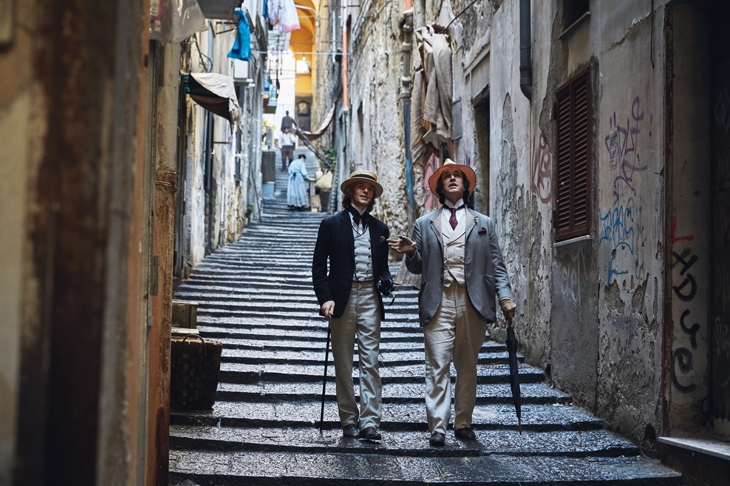Hereditary is the horror film that has been described as a ‘ride of pure terror’ and likened to The Exorcist and Rosemary’s Baby and The Shining, to which I can say only: in its dreams. Given I’m such a wuss when it comes to anything frightening — the child-catcher from Chitty Chitty Bang Bang still scares the living daylights out of me — I’m rather thankful, but I’m perplexed as to why it received such rave reviews. Ride of pure terror? I’ve had more terrifying rides on the teacups at the fair. I saw it at the paying cinema with my adult son and his girlfriend, who were also bored out of their minds and could only conclude that ‘all other critics are idiots’. This is as I’ve long suspected, but it’s useful to have it confirmed.
Written and directed by Ari Aster, Hereditary stars an overwrought Toni Collette as Annie, whose mother, Ellen, has just died. Annie had a difficult relationship with Ellen and I initially thought the scene was being set for a horror spin on ambivalent motherhood, which could have been interesting, but I was wrong. Unlike, for example, Get Out, which was clever and made a point, this never felt anything other than pointless. Stuff certainly happens after Ellen’s death. Symbols and signs appear. A book on spiritualism is discovered. Ellen’s grave is desecrated. But they occur flatly, as if being ticked off some shopping list.
The film is packed with tropes and clichés: a house in the woods, dead birds, a locked room, a creepy attic. These are knowing but there are others that, one suspects, aren’t knowing at all, and feed into one particular old chestnut: men are calmly sane while women are always hysterical. So Annie is the hysterical one, as is her 13-year-old daughter (Milly Shapiro), who goes all spooky and starts making clucking sounds. She also has an older son, Peter (Alex Wolff), who is not similarly afflicted — he’s a typical weed-smoking teenage slacker — while their father, Steve (Gabriel Byrne), has no role to play beyond telling Annie to get a grip. Poor Steve and poor Peter, though, who don’t come out of it well. But that’s what happens, one must suppose, if you throw in your lot withcrazy ladies.
It isn’t much of a reveal — it’s one minute of literal exposition right at the end — and it’s not much of a build-up to that reveal, as the pacing is so poor. There are decapitated heads and incinerations and rotting corpses but it’s never dramatic or exciting, and at the viewing I attended the audience laughed at the parts that were intended as the most terrifying, as it’s all so silly. Plus there are plot holes aplenty, as well as psychological ones. Annie wonders why Peter is so stand-offish with her. I don’t know, but might the fact that he once woke up in the middle of the night to find she’d doused him in petrol and was about to set fire to him have something do with it? Might it? One last thing, and I’ll be vague here, to avoid spoiler accusations, but to those who have already seen this: why did the power have to be transferred to a male form? Why wasn’t a girl good enough?
Your better bet is The Happy Prince, Rupert Everett’s passion project about Oscar Wilde’s last, wretched years. No,I didn’t much wish to see Wilde being driven to his death either, but while the film is sad, it is ravishingly sad, and I just love Everett, who’s said so often that his career is over that he’s kind of made a career out of it. Respect.
Everett wrote, directed, produced and stars as Wilde who, at the point that the story is taken up, has just been released from prison for gross indecency. Shunned by British society, he is forced into exile in France and Italy but, even so, he’s cornered in a church one day by a group of Hoorah Henrys out for his blood, and it is so sad, but ravishingly sad, with the light in the church pouring in like melted butter.
Using vignettes and flashback, we learn about his few loyal friends, his relationship with his wife and sons, which was devoted if impossible, and how he allowed Bosie to continue to destroy him. This occasionally slips into cheap sentiment, but there are some stand-out scenes — Wilde singing ‘The Boy I Love Is Up In The Gallery’, for instance — and, of course, there are some terrific lines. ‘I am dying beyond my means,’ he will complain on his deathbed. As for Everett, he is terrific. His Wilde is not hagiographic. His Wilde is brilliant but also foolhardy, exploited but also wilfully self-destructive, funny but also pathetic. A sad film, but ravishingly so.






Comments